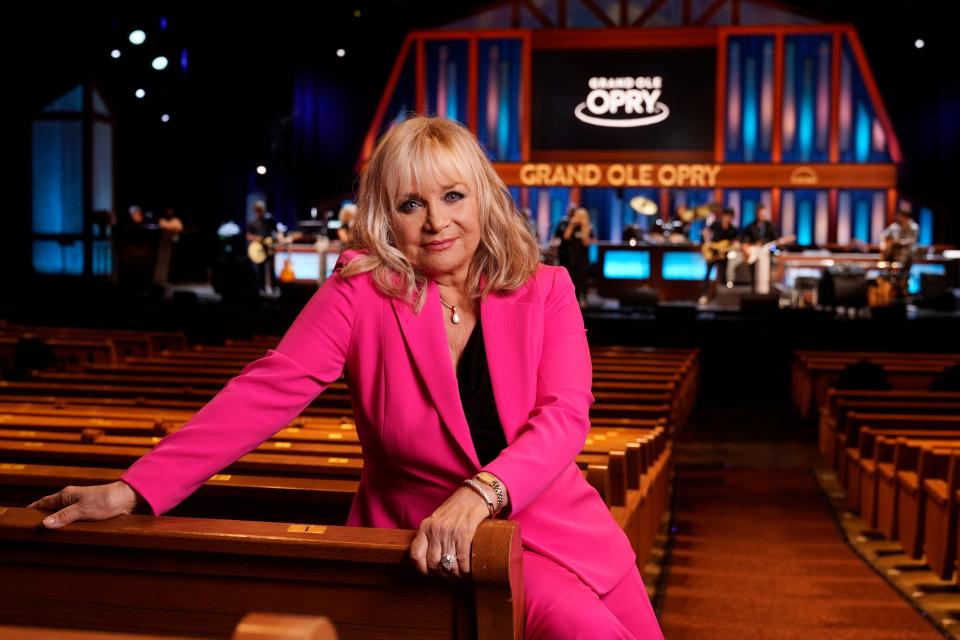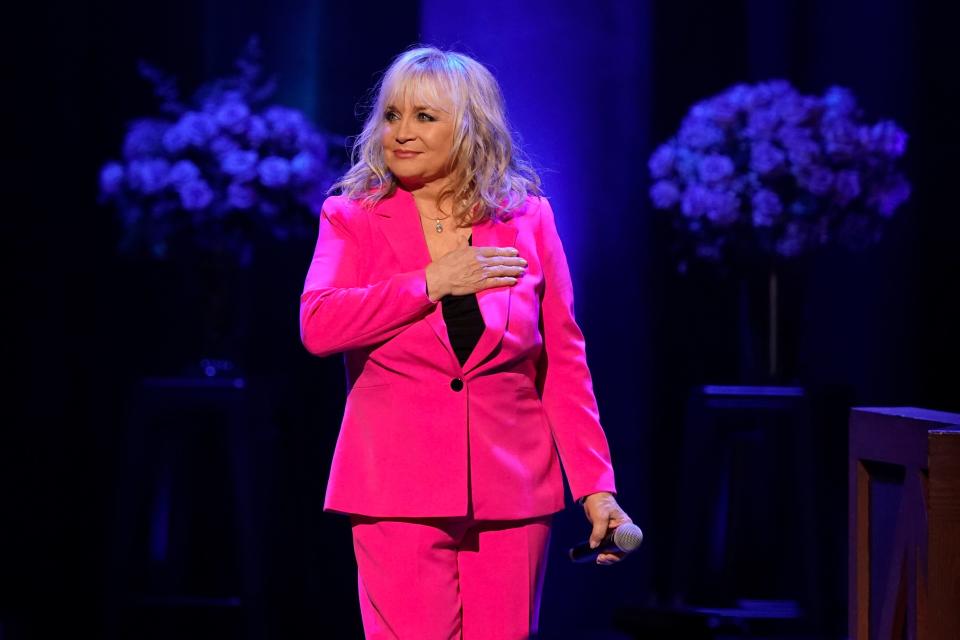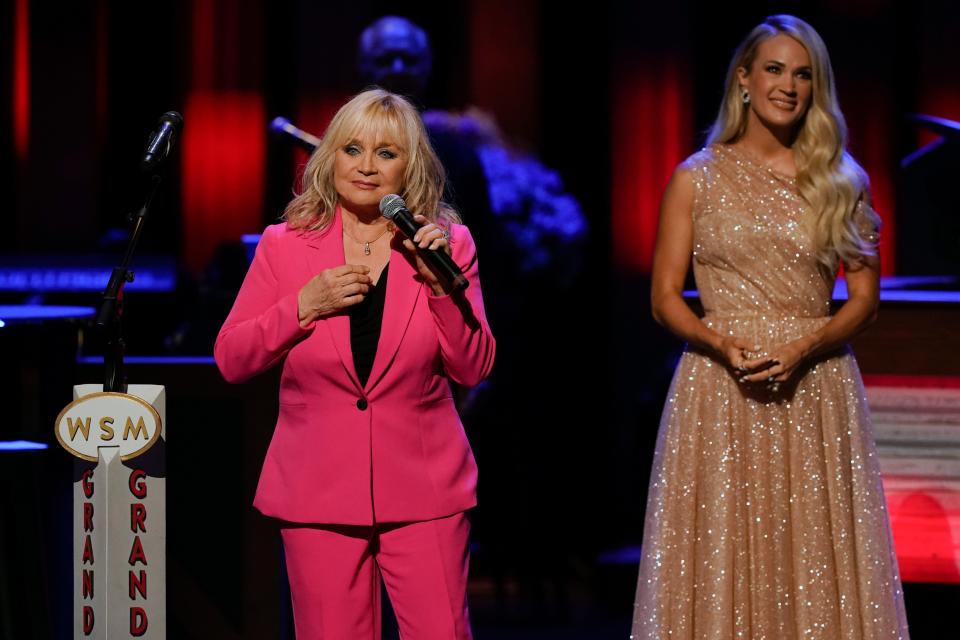Barbara Mandrell has surprise appearance at Grand Ole Opry 25 years after retirement
The Grand Ole Opry celebrated a half-century since Barbara Mandrell's induction into the iconic country music organization Saturday. The Opry has played a foundational role in her life and career.
On that evening in 1967 – just after her then-new husband Ken Dudney, a Navy pilot, was deployed to Vietnam – the former country music child star visited the Ryman Auditorium with her family for a live taping of the Opry's weekly television program.
While sitting in the Ryman's balcony, the then-retired Mandrell saw Dolly Parton and told her father, "If you'll manage me, I want to get back into show business."
"If you want me to," he replied, "I'll bet my last penny on you."
Her father's bet has paid unfathomable dividends and inspired generations of fans, fellow artists and every great female performer that has followed in her legacy.
Mandrell is currently the Opry's 10th-oldest active inducted member. However, in studying her contributions to the art of live performance, her membership carries timeless resonance in every country music conversation.

Barbara Mandrell interview:: Singer reflects on 50 years of family and friendship with the Grand Ole Opry
"The Grand Ole Opry feels comfortable and is home," Mandrell says. "I'm proud to be a member of the family of members that can call the Opry home for the rest of their careers."
Her relationship with the program's longtime hosts Roy Acuff and Minnie Pearl is also noteworthy.
Respectfully, Mandrell still refers to the onetime self-proclaimed "King of Country Music" and first living inductee into the Country Music Hall of Fame as "Mr. Acuff."
"Mr. Acuff and (then-Opry general manager) Bud Wendell inducted me into the Opry on July 29, 1972," says Mandrell, adding that the night was "one of the proudest moments of her career."
Acuff's "wonderful, beautiful introductions" and notes of support ("treasured compliments") were highlights of their friendship, she says.
Currently, a shirt emblazoned with the title of Mandrell's 1981 hit single "I Was Country When Country Wasn't Cool" is available for sale on the Grand Ole Opry website. When asked about the importance of one of her signature songs to summarize her career, she offered the story she told the song's writers 24 hours before it was written.
"One day, I was telling Kye Fleming and ?Dennis Morgan, that when I was a child, kids used to tease me, 'Yeehaw, country music,' they'd say, trying to tease me or make me feel embarrassed. Years later, those same kids were adults and showed up in autograph lines.
"It might be tacky of me to say that, but I'm proud of country music. I love it. It's everything to me."
Mandrell made a rare public appearance Saturday night at the Opry to celebrate her 50th anniversary of being an Opry member.
Born in Texas and raised in California, Mandrell was just 23 when she became a member in July of 1972. But she was already a seasoned entertainer by the time she came to Nashville, after her teenage years were spent playing steel guitar and appearing regularly on the California-based country TV show “Town Hall Party.”

Carrie Underwood interview: Singer on upholding the "hustling" legacies of top-tier country icons like Barbara Mandrell, Dolly Parton
Over her decades-long career, the actor, multi-instrumentalist and singer turned millions of fans onto country music in the ’70s and ’80s, not only through her popular TV show “Barbara Mandrell and the Mandrell Sisters,” but also through hits like “Sleeping Single in a Double Bed,” “If Loving You is Wrong (I Don’t Want to be Right)” and “I Was Country When Country Wasn’t Cool.”
She became the first country artist to earn back-to-back entertainer of the year awards from the Country Music Association, crossing over with R&B covers and bringing glamour and showmanship to the genre. Her performances were a showcase of her musicality, whether she was singing to the top of the rafters, playing pedal steel, the banjo or the saxophone.
“It’s called show business. You need to show them something,” Mandrell told the Associated Press. “Otherwise, they could sit at home and listen to your recordings or listen to you on the radio. You’ve got to give them something that entertains them.”

2014 Musicians Hall of Fame induction: 12 members added, including Barbara Mandrell, Randy Bachman
This Saturday night, Mandrell was still a champion of country music. Before the show began, Mandrell watched Carrie Underwood from side stage as Underwood did her soundcheck of “I Was Country When Country Wasn’t Cool,” stopping to give her a hug and greeting Underwood’s band members.
Underwood said growing up, Mandrell’s voice was always around.
“She has been such an inspiration to me and so many others that stand on the shoulders of great female artists like her,” Underwood told the Opry crowd.
Related: Carrie Underwood talks 'selfish' duet with Axl Rose, 'timeless' appeal of 'Denim & Rhinestones'
During the Opry show, Mandrell enthusiastically applauded the all-female artist lineup, including CeCe Winans, Linda Davis and Suzy Bogguss, as they performed her hits.
“I already feel on top of the world. I feel the deepest of gratitude and excitement because I am such a huge fan of these ladies,” said Mandrell.
From her seat in the middle of the crowd, Mandrell waved and blew kisses at her fans, who snapped photos of the country star.
Mandrell hasn’t played music or sung — other than in church — since she retired in 1997. Her last concert ever was held at the Opry House and made into TV special called, “Barbara Mandrell and the Do-Rites: The Last Dance.”
Dressed smartly in a hot pink pantsuit and surrounded on stage by 50 dozen lavender-colored roses bought by her fans, Mandrell gave another goodbye from the same Opry stage 25 years later.
“I chose my home to do my final performance on and it was this one,” Mandrell said. “God bless you!” she told fans before she walked off stage into the shadows.
Contributing: Kristin M. Hall, The Associated Press
This article originally appeared on Nashville Tennessean: Barbara Mandrell returns to Grand Ole Opry 25 years after retirement
